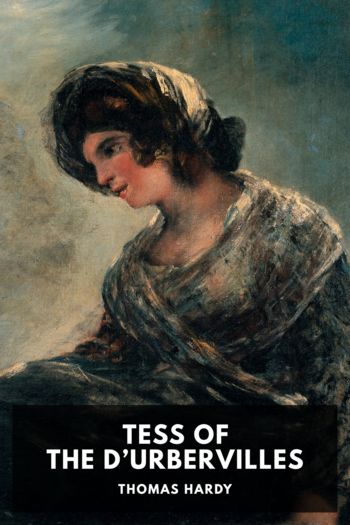Tess of the d’Urbervilles - Thomas Hardy (best color ereader .txt) 📗

- Author: Thomas Hardy
Book online «Tess of the d’Urbervilles - Thomas Hardy (best color ereader .txt) 📗». Author Thomas Hardy
Under his escort she went tardily forward to the main front, whose shuttered windows, like sightless eyeballs, excluded the possibility of watchers. The door was reached a few steps further, and one of the windows beside it was open. Clare clambered in, and pulled Tess in after him.
Except the hall, the rooms were all in darkness, and they ascended the staircase. Up here also the shutters were tightly closed, the ventilation being perfunctorily done, for this day at least, by opening the hall-window in front and an upper window behind. Clare unlatched the door of a large chamber, felt his way across it, and parted the shutters to the width of two or three inches. A shaft of dazzling sunlight glanced into the room, revealing heavy, old-fashioned furniture, crimson damask hangings, and an enormous four-post bedstead, along the head of which were carved running figures, apparently Atalanta’s race.
“Rest at last!” said he, setting down his bag and the parcel of viands.
They remained in great quietness till the caretaker should have come to shut the windows: as a precaution, putting themselves in total darkness by barring the shutters as before, lest the woman should open the door of their chamber for any casual reason. Between six and seven o’clock she came, but did not approach the wing they were in. They heard her close the windows, fasten them, lock the door, and go away. Then Clare again stole a chink of light from the window, and they shared another meal, till by-and-by they were enveloped in the shades of night which they had no candle to disperse.
LVIIIThe night was strangely solemn and still. In the small hours she whispered to him the whole story of how he had walked in his sleep with her in his arms across the Froom stream, at the imminent risk of both their lives, and laid her down in the stone coffin at the ruined abbey. He had never known of that till now.
“Why didn’t you tell me next day?” he said. “It might have prevented much misunderstanding and woe.”
“Don’t think of what’s past!” said she. “I am not going to think outside of now. Why should we! Who knows what tomorrow has in store?”
But it apparently had no sorrow. The morning was wet and foggy, and Clare, rightly informed that the caretaker only opened the windows on fine days, ventured to creep out of their chamber and explore the house, leaving Tess asleep. There was no food on the premises, but there was water, and he took advantage of the fog to emerge from the mansion and fetch tea, bread, and butter from a shop in a little place two miles beyond, as also a small tin kettle and spirit-lamp, that they might get fire without smoke. His reentry awoke her; and they breakfasted on what he had brought.
They were indisposed to stir abroad, and the day passed, and the night following, and the next, and next; till, almost without their being aware, five days had slipped by in absolute seclusion, not a sight or sound of a human being disturbing their peacefulness, such as it was. The changes of the weather were their only events, the birds of the New Forest their only company. By tacit consent they hardly once spoke of any incident of the past subsequent to their wedding-day. The gloomy intervening time seemed to sink into chaos, over which the present and prior times closed as if it never had been. Whenever he suggested that they should leave their shelter, and go forwards towards Southampton or London, she showed a strange unwillingness to move.
“Why should we put an end to all that’s sweet and lovely!” she deprecated. “What must come will come.” And, looking through the shutter-chink: “All is trouble outside there; inside here content.”
He peeped out also. It was quite true; within was affection, union, error forgiven: outside was the inexorable.
“And—and,” she said, pressing her cheek against his, “I fear that what you think of me now may not last. I do not wish to outlive your present feeling for me. I would rather not. I would rather be dead and buried when the time comes for you to despise me, so that it may never be known to me that you despised me.”
“I cannot ever despise you.”
“I also hope that. But considering what my life has been, I cannot see why any man should, sooner or later, be able to help despising me. … How wickedly mad I was! Yet formerly I never could bear to hurt a fly or a worm, and the sight of a bird in a cage used often to make me cry.”
They remained yet another day. In the night the dull sky cleared, and the result was that the old caretaker at the cottage awoke early. The brilliant sunrise made her unusually brisk; she decided to open the contiguous mansion immediately, and to air it thoroughly on such a day. Thus it occurred that, having arrived and opened the lower rooms before six o’clock, she ascended to the bedchambers, and was about to turn the handle of the one wherein they lay. At that moment she fancied she could hear the breathing of persons within. Her slippers and her antiquity had rendered her progress a noiseless one so far, and she made for instant retreat; then, deeming that her hearing might have deceived her, she turned anew to the door and softly tried the handle. The lock was out of order, but a piece of furniture had been moved forward on the inside, which prevented her opening the door more than an inch or two. A stream of morning





Comments (0)